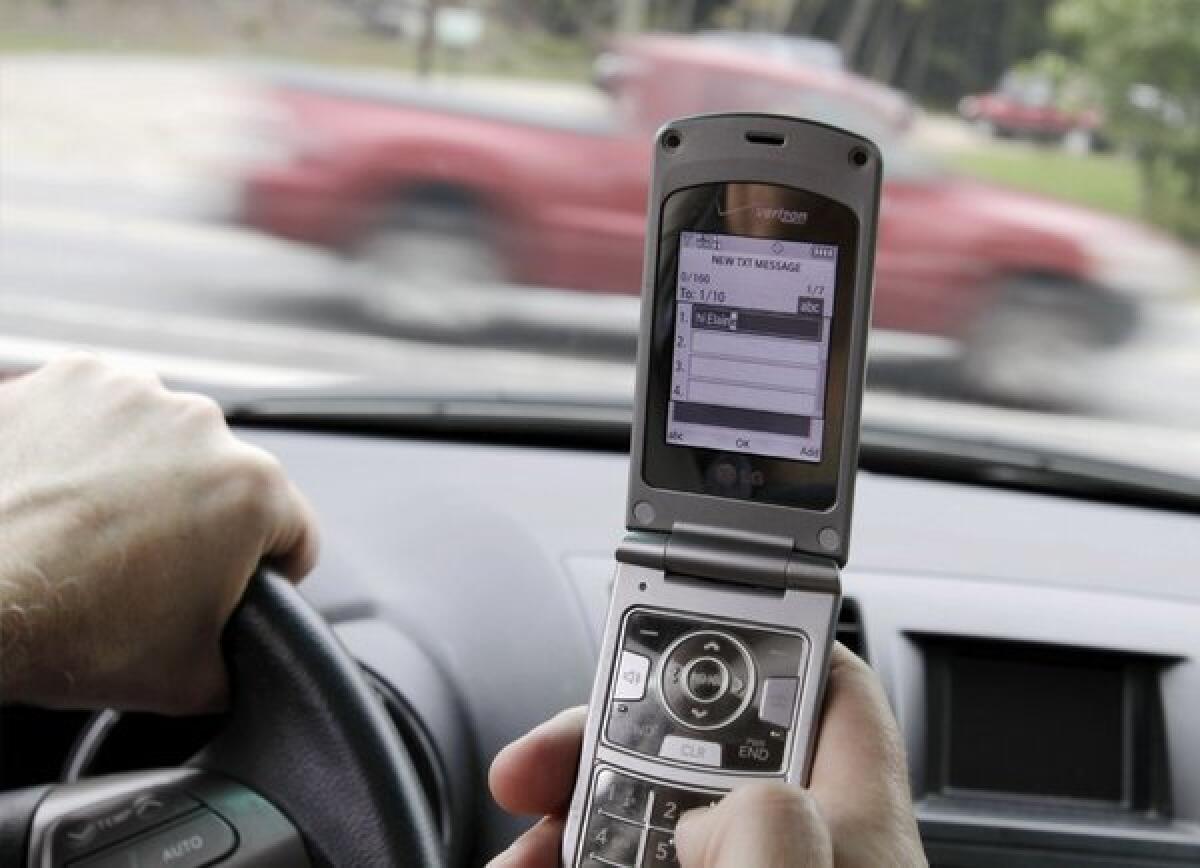New Jersey court: Texting with a driver can get you in trouble, too

- Share via
Can you be held responsible for an accident that happens miles away because you texted the driver?
A New Jersey appeals court panel says yes -- and its recent ruling is notable not just for trying to crack down on texting and driving, but for interpreting the way that technology has reshaped life.
On Sept. 21, 2009, Kyle Best, 18, crashed his pickup truck into a married couple riding a motorcycle after Best’s truck crossed the center line on a curve. Best had been texting with an acquaintance. David and Linda Kubert both lost their left legs in the accident.
The Kuberts settled with Best after filing suit, but also sued Best’s acquaintance, Shannon Colonna, arguing that she was “electronically present” in Best’s truck by texting him, and was thus partially responsible for distracting him on the road. A lower court dismissed that claim, citing lack of evidence, and the Kuberts filed an appeal.
In a specific sense, Colonna won: The three-judge panel from the Superior Court of New Jersey’s appellate division unanimously agreed Tuesday that there was insufficient evidence to determine whether Colonna was responsible for distracting Best.
But for the rest of New Jersey’s texters, the court lay down a new standard of responsibility: two of the judges, with a third dissenting in part in a concurring opinion, said that texters could be held responsible in civil court for distracting a driver, provided they had a good reason to believe that the driver would actually respond.
The court’s language says “when the sender ‘has actual knowledge or special reason to know’ ... from prior texting experience or otherwise, that the recipient will view the text while driving, the sender has breached a duty of care to the public by distracting the driver.”
The court then makes a unique philosophical turn in addressing how technology users interact with reality, by arguing that when a “sender knows that the text will reach the driver while operating a vehicle, the sender has a relationship to the public who use the roadways similar to that of a passenger physically present in the vehicle.”
The judges cited an interesting hypothetical: “A is driving through heavy traffic. B, a passenger in the back seat, suddenly and unnecessarily calls out to A, diverting his attention, thus causing him to run into the car of C. B is negligent toward C.”
In other words, texting someone can sometimes be the same as actually being with them. The implication of this point is a bit larger: The physical world doesn’t exist separately from cyberspace; technology and life often overlap, sometimes with lethal consequences.
“I think the court is right to define ‘presence’ as not only rooted in physical space, but also by attention -- something digital communication can garner a substantial amount of, even over great distance,” said Nathan Jurgenson, a digital theorist who has written about these issues.
However, Jurgenson added, “The decision to pick up the phone is ultimately the driver’s.”
The court ultimately agreed, holding that texters weren’t negligent simply by texting a driver -- only if they knew there was a likelihood the driver would respond while driving.
In a concurring opinion, Judge Marianne Espinosa nonetheless critiqued the philosophical move of equating a texter with being an unruly passenger in a car.
“A person who is not present in the automobile lacks the firsthand knowledge of the circumstances attendant to the driver’s operation of the vehicle that a passenger possesses and has even less ability to control the actions of the driver,” Espinosa wrote. Nonetheless, she added that the other judges’ analysis was “helpful.”
Using a non-hands-free cellphone while driving is mostly illegal under New Jersey state law. After the accident, the state legislature also passed a law that an injury accident stemming from phone use can lead to fourth-degree assault charges and possible prison time.
Under New Jersey law, the plaintiff must prove liability for causing negligence.
According to federal statistics, 3,331 people were killed in crashes involving a distracted driver in 2011, with another 387,000 people hurt. 10% of injury crashes were thought to involve distracted drivers.
ALSO:
Women protest judge’s comments in Montana rape case
Obama honors King, but also pushes his own political agenda
Female midshipman testifies in naval Academy sex assault case
Follow L.A. Times National on Twitter
More to Read
Sign up for Essential California
The most important California stories and recommendations in your inbox every morning.
You may occasionally receive promotional content from the Los Angeles Times.











